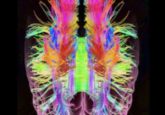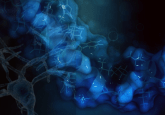A drink a day takes the brain away?

A new study indicates that even moderate drinking is associated with reductions in brain volume, with two drinks a day equating to aging two years.
It’s hardly an esoteric secret that consistent heavy drinking staggers arm in arm with adverse effects. Culture and history are littered with the sprawled stories of overindulgent artists in all mediums, frequently accompanied by the narrative linking their bent for the bottle with creative mastery or even genius. But how accurate is this? To some extent, the habit of equating these self-destructive tendencies with the creative cultural markers of the likes of Van Gogh, Hemmingway or Winehouse, among a legion of others, increasingly conflicts with the scientific data on how drinking affects the brain itself. Numerous studies and a wealth of data have provided us with a clear picture that heavy drinking creates structural and size alterations in the brain associated with cognitive impairments.
Less clear are the parallels between moderate or light drinking and neural health, with a great deal of research undertaken that has only produced a conflicting message. Some studies continue the negative news that even moderate alcohol intake can be detrimental for the brain, while others draw no conclusive associations. You may even remember the suggestion that moderate drinking could benefit health, based on a single study in 2008†.
So maybe you were holding out hope that a couple of relaxing drinks after work wasn’t going to make the greatest difference in the long term. You might have been tempted to ignore this story. You might have been thinking about going for a drink, or maybe you’re having one now. If so, turn and shake the hand of your friend, confirmation bias, for propping you (and the rest of us) up all of these years. Unfortunately, researchers at the University of Pennsylvania (PA, USA) have performed a recent analysis utilizing the sweeping analytical power of big data. And big data is not concerned with your hunches.
 When did you last walk down memory lane? How memories are organized in time
When did you last walk down memory lane? How memories are organized in time
Researchers begin to understand how the hippocampus organizes memories in chronological order by monitoring rats during an odor memory task.
Using the UK Biobank, this study, published in Nature Communications, representing 36,000 adults between 40-49 years old, drew together the largest collection of MRI brain scans, alcohol-related behavioral phenotypes and socioeconomic environmental measurements. They concluded that even a few glasses of beer or wine a week could be enough to correlate with overall reductions in brain volume.
Understanding the complex set of variables and circumstances at play, the researchers controlled for age, height, handedness, sex, smoking status, socioeconomic status, genetic ancestry, country of residence, and corrected brain-volume data for head size. When they grouped the biobank participants by average alcohol consumption, a pattern became apparent: even in the face of the control measures, overall brain matter volume was reduced with increasing consumption.
As reductions in brain volume are an abstract idea, even if broadly understood to be negative, the researchers drew comparisons to the reductions that occur in the process of aging. While a single unit of alcohol per day in a 50-year-old had negligible impacts associated with roughly half a year of aging, two or three units per day were associated with reductions in both gray and white matter. equating to roughly three and a half years of aging.
Is nothing sacred? Apparently not. While this news might be enough to drive you to drink, the researchers are keen to emphasize the fact that the study looked only at correlation and not causation and – no doubt conscious of that now-tedious phrase echoing shrilly every time a correlation is recognized – are quick to acknowledge that the one does not imply the other. However, they do have designs to pin down those causations using new biomedical datasets involving younger groups of people. In the meantime, they are content in the knowledge that their findings may encourage people to take a closer look at their drinking habits. And, in light of all of this data, if you’re a creative sort with the archetypal thirst, perhaps reconsider whether it is actually helping your art.





